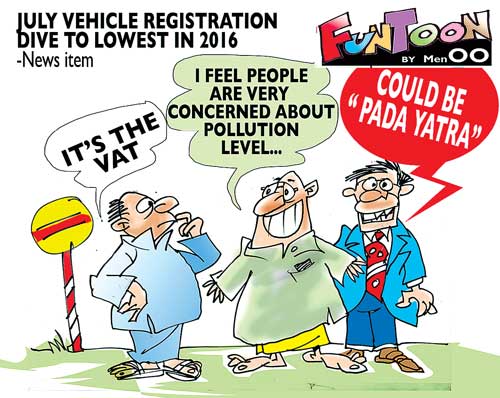Tuesday Mar 03, 2026
Tuesday Mar 03, 2026
Saturday, 20 August 2016 00:00 - - {{hitsCtrl.values.hits}}
When the formula of a “national government” or “grand coalition” as it was then termed, between the UNP and the SLFP, was first mooted in the early 1970s by J.R. Jayewardene and Anura Bandaranaike, the established Left was horrified, with LSSP theoretician Hector Abhayawardena denouncing the project as that of a “government of capitalist concentration”. The radical Left thought it would result in a most welcome polarisation, eliminating the middle ground in a decisive leftward displacement by default when the wheel of public opinion inevitably turned.
It was my father, at the time Editor Daily News and Editor-in-Chief of Lake House, who drolly editorialised that a UNP-SLFP convergence would not come about because “the leaders of the power-elite are unlikely to be quite so conveniently myopic”. He was right. Mrs. Bandaranaike and Felix spurned the JRJ-Anura project of convergence.
Over four decades later, the leaders of the bourgeoisie have become quite so conveniently myopic, with the official SLFP (propelled by Anura’s sister) hurling itself into the arms of the UNP (led by JRJ’s distant nephew) precisely at a time when the UNP is embarking on harsh economic cutbacks and is locked in a group hug with the West and the Tamil diaspora.
Time for a new political force
I have a French friend who is an expert on crowds. He’s an expert on crowds because he was a leader of the legendary, huge French trade union confederation the CGT and has participated in more mass demonstrations all over the world than I probably have hairs on my head. Coming from Katunayaka airport he was caught up all the way to Colombo, in the Paada Yatra crowd. He says it was “very impressive, several hundred thousand strong, consisting mainly of persons of modest means, but marching with great determination rather than ambling or shuffling.”
When I match his guesstimate of several hundred thousand with the number of two hundred thousand mentioned in the report on the morning after in Colombo’s leading newspaper for the blue chip corporate entrepreneurial and managerial classes, the Daily FT, I know we’re looking at a bigger crowd than has ever marched into Colombo in a single political demonstration.
In terms of political importance the last such would have been in the years 1963-1964, namely the United Left Front (ULF) demonstration of 1963 and the United Front (i.e. SLFP-LSSP) May Day of 1964 and the Maoist CCP march also of May Day ’64.
As my French friend whose new book entitled ‘Comrades, I request the floor!’ is about to be launched in Paris says, the demonstration showed that as in many other countries, a significant section of the population has said “enough” and that the conditions are ripening for “a new political force” to emerge.
The official SLFP is wriggling on the VAT hook with internal divisions over whether or not to vote for it and if so on which conditions. If the SLFP thinks it is uncomfortable over VAT, its discomfiture is only going to get worse over ETCA, the Special Courts with Special Counsel, and the re-merger of the Northern and Eastern provinces in a non-unitary scheme of autonomy.

Delivering accountability and devolution
What will the SLFP do on these gut issues which are also and at the same time, the SLFP’s traditional ones and cut deeply into their tradition? These issues are so emotive and so much part of the SLFP’s basket of issues and organic discourse, that they cannot be finessed; there is hardly any middle ground to occupy.
All these issues will crop up and (to switch the metaphor) this entire minefield will probably have to be traversed between now (VAT) and the September 2016 and March 2017 sessions of the UN Human Rights Council. That’s a matter of months, not years.
Of course it does have to be this way. Given the realities of global and national politics, it was always a trade-off between devolution and accountability but neither this present Government nor the previous one understood it. In our most conspicuously successful diplomatic moment in recent decades, at the UNHRC in Geneva in May 2009, when we won 29 votes out of 47, we adhered to the language of the joint communiques between the UN Secretary General and President Rajapaksa, promised to implement the 13th amendment and staved off the accountability challenge.
The previous government then thought it was possible to hold off on both devolution and accountability. It hadn’t understood the external realities.
The new Government thought it could deliver on both accountability and devolution. It hasn’t understood the domestic realities.
Not only are devolution and accountability almost antinomian, they work in reverse direction. The more you concede on autonomy the less you can concede on accountability and vice versa.
Add to this the economic factor. The more you resort to economic cut backs the less you can concede on either accountability or ethnic autonomy, because you are dealing with growing numbers of disaffected people from the majority community.
Indeed the more you push economic shock therapy together with ethnic devolution, the more you risk a backlash. The more you combine economic shock therapy, ethnic devolution and wartime accountability into a cocktail and shake it, the more likely it is to become incendiary.
That is why no other country has done it the way that Sri Lanka is trying to. That is because the current crop of Sri Lankan Government politicians and policy planners are, as the old English phrase goes, “either knaves or fools”, or more knavish and foolish, and arrogant to boot, than those in other societies.
Take for instance the TNA. If it had traded in accountability for devolution it could have accumulated enough goodwill across the political spectrum, to improve upon (“build on”) the 13th amendment. Instead, with its strident nonsense, especially on the part of Mr. Sumanthiran, on accountability, combined with the optics of the implementation of the Geneva Resolution being handled by Dr. Paikyasothy Saravanamuttu, Southern opinion will be rather less generously inclined on devolution.
If the PM’s Office, CBK’s ONUR and Mangala’s Foreign Ministry had stuck to a purely local accountability process through the existing laws, prosecutorial institutions and judicial system, i.e. selective, “low intensity accountability” instead of exceptional procedures, the coming blowback could have been pre-empted. Similarly, were the Constitutional changes limited to a bypass operation unclogging the dysfunctions in the 13th Amendment, it would not be a sitting duck for hostile petitioners. However, neither is the case: on both accountability and constitutional change the Government’s attitude is evangelical and the agenda is of drastic discontinuity.
The Opposition roadmap
The Joint Opposition, newly invigorated by the Paada Yatra, has a clear roadmap before it. Actually its roadmap is the same as the Government’s except that it has to study the Government’s roadmap and plan some really devastating ambushes along the way. That’s quite easy.
It can be fairly safely assumed that the Constitutional changes will be attempted before the accountability process because it may need a Constitutional change to bring the Special Courts and an office of the Special Counsel into being. Translated, this means the Constitutional package will emerge as a visible target by March 2017 the latest. Moreover, all this will happen during or after harsh economic cutbacks which will be implemented as part of the November 2016 Budget. This mix of the ethnic and the economic can make for an anti-Government electoral tsunami at local elections and a referendum (or referenda).
Between now and 2020 the Joint Opposition and patriotic civic associations must not drop the ball (as with the Office of Missing Persons Bill) on ETCA, the Hanuman Bridge, the Special Courts and Special Counsel’s office, the North and East re-merger and federalisation. Instead it must greatly tighten its ‘fielding’ skills at least to 19th amendment (2015) levels. It must flood the courts with petitions. It must launch public campaigns of protest on the streets and in the social media on these issues, bearing in mind that the decisive battle will be the Referendum on the Constitution.